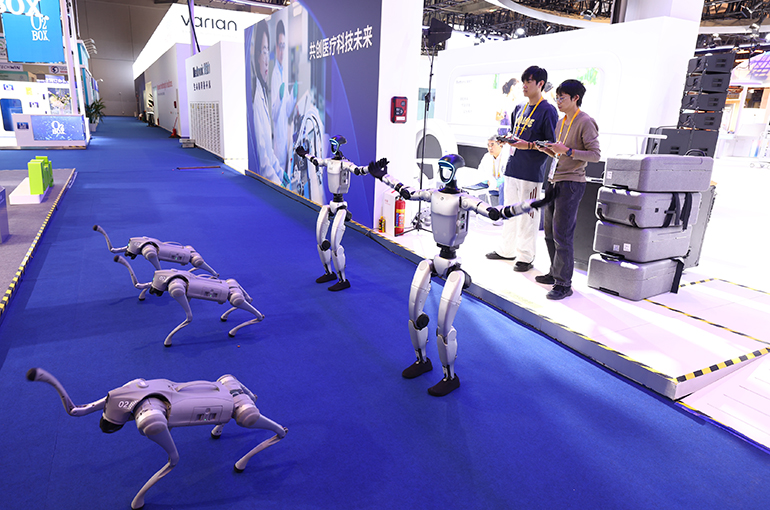 AI, Localization Stand Out as China Int’l Import Expo Opens in Shanghai
AI, Localization Stand Out as China Int’l Import Expo Opens in Shanghai(Yicai) Nov. 5 -- As the annual China International Import Expo opens in Shanghai today, two themes are at the forefront: artificial intelligence is embedding itself deeper into real-world industries, and multinational companies are shifting from selling in China to innovating and producing here.
More than 3,000 exhibitors from over 120 countries have descended on the eighth CIIE to show off their new intelligent products, with many shifting their country strategy toward local research, development, and production.
Tesla's Cybercab, a robotaxi with no steering wheel or pedals, is making its Asian debut at the six-day CIIE. the vehicle will enter production in the second quarter of next year. Chinese self-driving truck developer Westwell is also showcasing its cabin-less electric Q-Truck, which is already available in 28 countries.
China’s Fosun Pharmaceutical Group is exhibiting its Marie upright particle therapy system, which rotates the patient rather than using a massive rotating gantry, shrinking what normally required a three-floor, 120-square-meter treatment room down to a single-storey, roughly 30-sqm space.
Becton, Dickinson and Company has brought along multiple smart products, including its APM intelligent hemodynamic monitoring system, MMS intelligent medication management platform, and an AI hand-diagnosis tool, which relies on data analysis, smart tracking, and algorithms to support decision-making.
The US company has also debuted its magnetic resonance imaging 4F Slim implantable port, which features the world's thinnest catheter tailored to Chinese vascular anatomy, along with six other products. In addition, BD has now show its smart medical devices for the elderly, including the PureWick female bedside management system and wearable injectors.
Localization is a central theme for multinationals at this year’s CIIE. Tesla is displaying its energy storage solutions after its Megapack plant in Shanghai, its first such factory outside the United States, began production in February.
Fosun Pharma has brought imported and domestically produced da Vinci surgical robots to its booth, with a company representative saying it began producing the robots in Shanghai in 2023, lowering costs and enabling greater customization. As of May, some 480 da Vinci systems have carried out more than 600,000 operations in China.
China's role is shifting from being an end market to being a development hub, leveraging local engineering talent and manufacturing ecosystems, a number of industry observers pointed out.
Italian machine tool manufacturer PAMA is exhibiting products made in Lingang Special Area, a key testing ground for economic and trade policies within the Shanghai Free Trade Zone.
The Lingang plant’s localization rate is at about 85 percent, and it hosts a local R&D team focused on serving China, according to Chief Financial Officer Lu Guoguang. “Local production allows us to customize products for regional markets, which is not the case in our German operations,” he said.
SYR, a German water treatment firm taking part in its eighth CIIE, is exhibiting an AI-powered dual-tank system with self-learning capabilities. It invested CNY50 million (USD7 million) in 2023 to build the first water softener production line in China with an annual capacity of 80,000 units.
Editor: Martin Kadiev